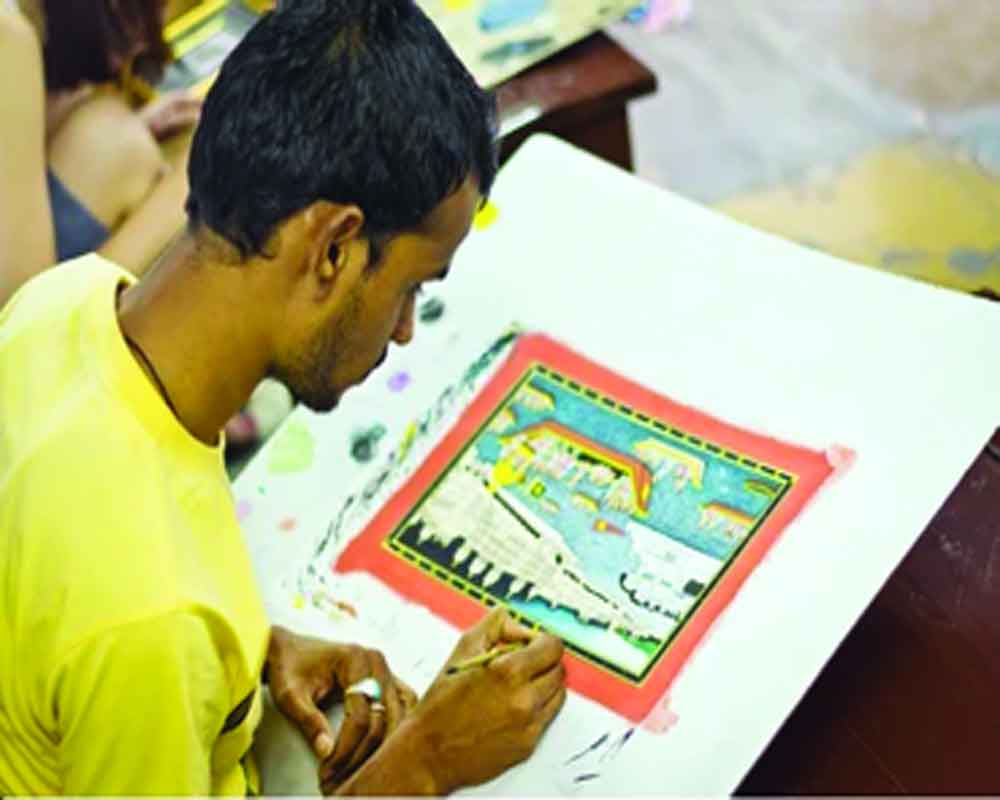Decorative wall painting is transforming the lives of substance users in Manipur and beyond, giving them a purposeful life to the fullest extent
Manglemba Ningombam was 29 when he started experimenting with drugs like many of his friends in his village in Imphal, Manipur. When it started to impact their lives, some of them were able to give it up. Ningombam wasn’t one of them. Over the next 15 years, this addiction would spin his life into a vicious cycle of highs and lows. Personal crisis and the death of his parents exacerbated his loneliness, leading him to consider ending his life. Fortunately, a local NGO was able to reach out in time and admit him to a drug addiction and rehabilitation centre. This was to change his life forever.
While admission to a rehabilitation centre provided the medical and counselling support to wean him off drugs, it was an innovative intervention conducted here that catalysed the transformation. Implemented jointly by Makers Foundation, a Manipur-based not-for-profit working to empower the alcohol and drug user community, and CADAP, a community-based organisation of drug users, the initiative to provide training in decorative wall painting has opened new doors. This skilling has given them a source of livelihood and income and the confidence to overcome stigma, a big barrier to recovery. Most importantly, it has brought hope and belief that a meaningful life without drugs is possible, thus also reducing the chances of drug abuse relapse.
Ningombam, who was a part of the first batch of 400 trainees of this decorative wall painting programme started in 2022, is now its salaried lead trainer. Just how life-saving this journey has been can be gauged by the fact that there are more than 1.2 lakh psychoactive substance dependants in Manipur. The state’s proximity to the Golden Drug Triangle (Myanmar, Laos, Thailand, Vietnam) and its large-scale poppy cultivation means easy availability of drugs. It has given Manipur the dubious distinction of having one of the highest prevalence rates in opioid use and an increasing number of drug addicts in the state’s rehabilitation centres. Internal conflict and lack of employment opportunities have compounded the problem, leading to a high percentage of relapse among those undergoing rehabilitation.
It was this challenge that led to the focus on skill-building as a means to break the chain. Makers Foundation began exploring ways to build the capacity of the substance-dependent community to become economically empowered once they had completed the treatment course. It hit upon the idea of decorative wall painting and partnered with AkzoNobel, a leading paints and coatings company, to provide the training. Besides providing the monetary resources for the programme, AkzoNobel, which also runs paint academies for training in decorative painting, joined hands to provide the necessary skills. At the end of the 16-day training in decorative wall painting, those with potential are selected for an advanced course of 30 days at AkzoNobel Training Centre in Kolkata.
It is not just the self-confidence that this intervention has been able to restore among the trainees. It has also been accepted by their families. For Bhimo, 37, learning a new skill and getting a job as a trainer at Makers Foundation helped him not only to stay off his addiction to alcohol but also helped regain the trust, respect and support of his family. When positive impacts like this and the encouraging feedback from the community led to the scale-up of the intervention to Assam last year, Bhimo was sent as a trainer. This was also in keeping with their Therapeutic Community Model based on the premise that a rehabilitated alcohol/drug user was better equipped to inspire other users to achieve their potential.
Though it has been challenging, with 44 per cent of the 6.7 million substance users being adolescents, the initiative has so far trained 200 persons admitted to rehabilitation centres in Assam’s Tinsukhia district. Hopefully, this initiative will now be able to empower the many invisible substance-dependent women and girls in need of a helping hand.
(The author is a journalist writing on development and gender. The views expressed are personal)


























